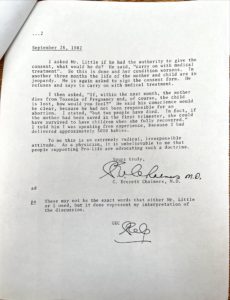May 24, 1989
In March of 1989, the government of Nova Scotia made legal amendments similar to those in New Brunswick, which prohibited the provision of, and denied funding for, abortions performed outside of approved hospitals. The province claimed that the law was passed to regulate medical practice and prevent health care privatization.
A couple of months later, Dr. Morgentaler opened the first Atlantic Canadian free-standing abortion clinic in Halifax and after he had performed some abortions there, he was charged. At the trial, he argued that the amendments were unconstitutional. The Canadian Constitution distributes legislative jurisdiction between the Parliament of Canada and the provincial legislatures, and the federal Parliament has exclusive jurisdiction over criminal law. Morgentaler argued that the Nova Scotia laws were unconstitutional because they violated a women’s Charter rights to equality and to security of the person, and because they were an “unlawful encroachment on the federal Parliament’s exclusive criminal law jurisdiction.”
Dr. Morgentaler was acquitted at trial because the judge found that “… the only reasonable conclusion that can be reached after considering all the circumstances is that this legislation was primarily created to keep free-standing abortion clinics, and in the specific, Dr. Morgentaler, out of Nova Scotia”, not for the purposes that the province claimed. That moved the case into the realm of criminal law, which is outside provincial jurisdiction. The Court of Appeal agreed, and the Supreme Court of Canada would ultimately decide in Dr. Morgentaler’s favour in 1993.


